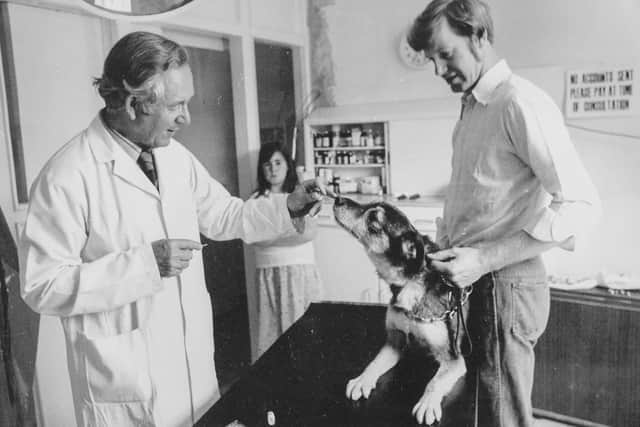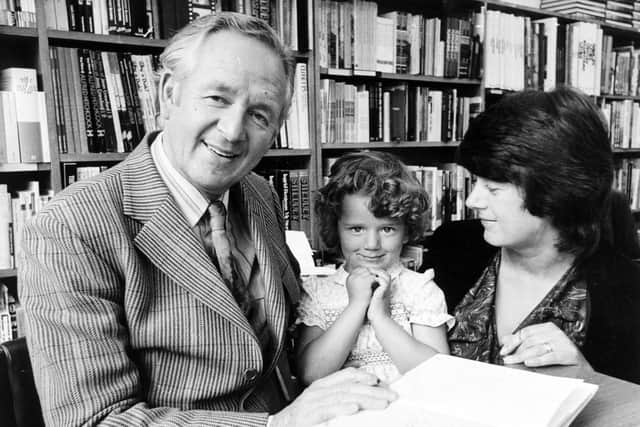The story of James Herriot - the lad from Roker who sold over 60 million books
and live on Freeview channel 276
One Mackem, although he didn’t speak like one, who would achieve critical and commercial success around the world, was Alf Wight. He was better known as James Herriot.
He considered himself a vet first; a writer very much second. But he combined both trades to achieve spectacular success. He would sell over 60 million copies of his books, some of which were adapted into films and television shows which became international hits.
The early life of a great author


Advertisement
Hide AdAdvertisement
Hide AdAlf Wight was born in Brandling Street, Roker, on October 3, 1916, a couple of minutes’ walk from Roker Park, home of the football club beloved by the Wight family.
The house was owned by his maternal grandfather and still stands. However, along with William Herschel, James Herriot is one of Sunderland’s more curious omissions from its list of blue plaque honorees.
Alf’s parents, Sunderland couple Jim and Hannah, had been married in 1915 in a Methodist chapel in Williamson Terrace. Jim was a shipyard plater, but also a talented pianist who played in cinemas.
Hannah was a singer with certain aspirations to grandeur. Later in life she derived great pleasure from talking loudly on public transport about her son’s success.


Advertisement
Hide AdAdvertisement
Hide AdStill, she was a good mother. Jim’s work meant the family settled in Glasgow, but Hannah made sure she was home in Sunderland when she gave birth to Alf. Throughout his life, Alf Wight was a regular visitor to his town of birth.
Aged three weeks, baby Alf, along with his dad’s piano, was taken to Glasgow where he would spend the next 23 years. By the end of this time he had qualified as a vet at the Glasgow Veterinary College.
His love of dogs and cats led him into the profession, which he said he entered: “Just when the profession was emerging from a long night of ignorance, into the scientific era.
“I had a compulsion to put down on paper a period which will never come back again. The old black magic period.”


Advertisement
Hide AdAdvertisement
Hide AdThe man who would become the world’s most famous vet began his career back in his native Sunderland, where he worked in a practice in 1940.
But he soon transferred to Thirsk in North Yorkshire where he would live for the rest of his days. Yet Wearside was never far from his thoughts.
The vet hits the big time and changes his name
The Thirsk practice was owned by Donald Sinclair, five years Herriot’s senior. The character Siegfried Farnon in All Creatures Great and Small was based on Sinclair (incidentally, Basil Fawlty was also based on a real person called Donald Sinclair).


By the 1960s he gave in to his wife Joan and finally began to write books. He was 50 years old by then, but had dabbled as a writer and was a voracious reader. He had a gift for writing humour that would shine through.
Advertisement
Hide AdAdvertisement
Hide AdAt first he produced short stories. But after a depressing series of rejections, he followed the advice that has stood authors in good stead for centuries. Write about what you know. Alf Wight knew about being a vet.
His first novel, If Only They Could Talk, was finally published in 1970. After a slow start, it was picked up for the American market where it became a bestseller. Americans loved his understated British humour and his whole life changed.
In 1975 his work was adapted into the film All Creatures Great and Small starring Anthony Hopkins. Then in 1978 it became a BBC series which ran for 89 episodes over 12 years. His books were translated into over 20 languages, including Japanese.
The Roker lad had hit the big time.
James Herriot/Alf Wight could have been more recognisable had he chosen to be. His pen name was far more famous than his face. He was quite obsessive about privacy for himself and those around him.
Advertisement
Hide AdAdvertisement
Hide AdThe market town of Thirsk today is keen for the world to know that James Herriot lived and worked there. Yet back in 1976, when Herriot was interviewed on television by Melvyn Bragg, Thirsk is not named, even though it is clearly seen. Nothing was to interfere with his privacy or his job as a vet.
The characters in his books never have the same names as the people they are clearly based upon, including the character based on himself.
Alf Wight re-named himself after a Scottish goalkeeper who played for Birmingham City in the 1960s. He simply liked the name (the real James Herriot is still around today, aged 80).
Despite all his “overnight” success, Alf Wight did not change. Long after he had made enough money to do as he pleased, he was still a practising vet, on call six days a week until he retired from the practice in 1989.
He always saw himself as a vet first and an author second.
Forever in love with Sunderland
Advertisement
Hide AdAdvertisement
Hide AdThose who are familiar with James Herriot and his work, usually think of him as a Glaswegian who defected to Yorkshire. While it is difficult to quibble, there is also no denying his deep affinity with his birthplace.
Herriot returned to Sunderland countless times and one of the main reasons for this, other than his being of pure Mackem blood, was his fanaticism for its football club.
As a lad he would watch both Celtic and Rangers many times. But according to a biography written by his son, Jim Wight: “Despite the fact that his team was 150 miles away, his allegiance to the Red and Whites never faltered.”
Fans of today can identify with a diary entry he made aged 16.
Advertisement
Hide AdAdvertisement
Hide AdHe wrote: “Eheu! I am plunged into the very depths of despondency. Life, to me, is dark and gloomy and the future looms up forbidding and hopeless.”
The reason for this spiralling despair? Sunderland had lost a cup tie at home to Derby County. He inherited this obsession from his father and uncles.
Like all Sunderland supporters, he was put through the wringer. However, unlike the vast majority of SAFC devotees, he would go to his grave with joyous memories of winning the league once and the FA Cup twice.
Another Herriot biography was written in 1998 by Graham Lord.
Advertisement
Hide AdAdvertisement
Hide AdLord says that during one of SAFC’s regular financial bad patches, by which time Herriot had made his fortune (he would leave over £5 million in his will), he invested a six-figure sum into the club, but still refused free season tickets for himself and his family.
James Herriot’s legacy
Alf Wight/James Herriot died in 1995 aged 78. Various accolades came his way both before and after, including an honorary doctorate and an OBE.
There are two James Herriot blue plaques, one each in Thirsk and Glasgow. A statue of him stands at Thirsk Racecourse. A pub, street and a locomotive are all named in his honour. In 2017 a Moscow museum had an exhibition entirely devoted to him.
In Sunderland a housing development, Herriot Gardens on Gray Road, is under construction. He never lived to see the Stadium of Light, although one of it’s plushest rooms is named the James Herriot Suite.
Advertisement
Hide AdAdvertisement
Hide AdHe described his own work as “pretty light stuff”. That may be true, but this Sunderland stalwart proved that great literature doesn’t always have to be heavy and grim.
Read it for yourself and find out.